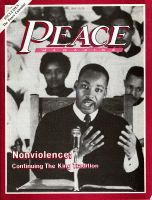
Peace Magazine April 1985, page 22. Some rights reserved.
Search for other articles by Moira Armour here
TORONTO -- "Young people like Terry Fox and Steve Fonyo might not have been cancer victims," according to Sister Rosalie Bertell. "If in the late fifties we had been more alert to the danger of low-level radiation, and fallout from nuclear tests, young people like Terry Fox, born in 1958, might not have been the victims of the growing incidence of cancer in our population. They were born at the height of the atmospheric testing, before any Treaty was signed. There is still no Comprehensive Test Ban Treaty."
Bertell, an expert on the hazards of radiation, made the statement at a conference of approximately 130 women meeting in Toronto on March 10 to examine women's experiences in negotiating non violent solutions to problems.
The meeting was organized by the Survival Committee of the National Action Committee on the Status of Women, assisted by the Voice of Women, as one of a series of "mini-conferences" set up by women in many Canadian cities in preparation for the International Women's Conference, "Women's Alternatives for Negotiating Peace," taking place at Mount Saint Vincent University in Halifax June 5--9.
Fifty women from other countries are being invited, and 250 Canadian women will take part in the five-day event. A major component of the program will be the simulation of peace negotiating with women seated at the negotiating table. Plans are taking shape to have this simulation -- along with major addresses and a panel of young people--televised and transmitted by satellite to women's groups meetings in many parts of the country.
Conference Co-ordinator Marion Kerans, from the Halifax Voice of Women, feels that "alternatives to the arms race must be found if we are to ensure a safe future for the world's people. Women have a unique perspective to bring to negotiations on peace and disarmament. After all, women have negotiated peace and resolved conflict in the home, school, workplace and the community for decades."
Planning for the conference started in June 1984, with 55 women from 26 national women's organizations meeting in Toronto to form the Coalition of Canadian Women's Groups: International Peace Conference. Since then, all women's organizations (and especially women members of peace groups) have been invited to join this Coalition and to endorse the goals of the Conference.
Among the groups already participating are the Anglican Women's Concerns Committee, the Canadian Conference on World Religions and Peace, the Catholic Women's League, Comox Valley Nuclear Responsibility Society, the Congress of Canadian Women, the Federation des femmes du Québec, NAC, the Island Peace Committee PEI, the New Brunswick Native Women's Council, Project Ploughshares, the United Church Peace Network, Voice of Women, the YWCA and women's committees from the political parties. The groups are planning local and regional conferences on similar themes, and are raising money to assist with the travelling costs of women from developing countries who will be attending the conference.
Participants at the Halifax Conference will attempt to: define true security; analyze the current status of international negotiations; trace the links between all forms of violence and the threat of war; share skills, experiences, and ideas on alternative ways to resolve conflict and build trust; explore how the application of these alternatives could reduce present levels of hostility; and promote ways to transfer global resources from arms to development.
The United Nations estimates that seventy percent of those who do work for social justice are women. Conference organizers feel that it is time that those peace workers be included in international negotiations for arms reduction and the resolution of international conflicts.
The Halifax Conference will develop innovative strategies in workshop settings, and bring them to the peace negotiating table. Women would negotiate, not from positions of national or personal power, but from concerns over issues, and a recognition that these concerns need to be under stood and addressed by many people.
Alternatives developed at this Conference are expected to be presented at the United Nations Conference in Nairobi, Kenya, in July 1985. The Halifax Conference will mark the end of the International Decade of Women. Women and women's groups interested in endorsing and participating in the Halifax Conference are invited to do so, and should write (or send cheques) to: Coalition des associations de femmes Canadiennes/Coalition of Canadian Women's Groups, 166 Bedford Highway, Salle/Room 9, Seton Annex, Halifax, Nova Scotia B3M 2J6.

Peace Magazine April 1985, page 22. Some rights reserved.
Search for other articles by Moira Armour here